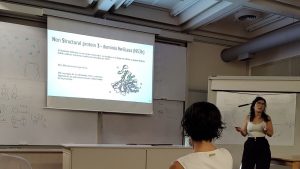Natalia Adler, Phd fellow at Center for Bionanoscience research (CIBION), successfully defended her thesis in Faculty of Exact and Natural Science of the University of Buenos Aires (FCEN - UBA)
Titled "Mechanistic study and computer-aided drug design against dengue virus", the main objective of this thesis was to contribute to the generation of new therapies for dengue, based mainly on computational techniques capable of guiding the process of rational drug design, and working closely with experimental groups to carry out the projects.

The therapeutic targets chosen were the envelope glycoprotein E and the helicase domain of non-structural protein number 3 (NS3h). In the case of helicase, the development of allosteric inhibitors was set as a goal, so a mechanistic study of it was carried out in the first instance. The results obtained in this work allowed the identification of four compounds with submicromolar activity against dengue virus and the obtaining of relevant information on the functioning of the NS3h enzyme.
Natalia did her research in the medicinal chemistry CIBION’s lab and he was supervised by Dr. Mariela Bollini and Dr. Claudio Cavasotto. The jury, which was made up of Dr. Ari Zeida, Dr. Florencia Martini and Dr. Daiana Capdevilla, rated her with a 10.

The dangers of dengue
It is the viral disease transmitted by arthropods with the highest incidence worldwide, reaching values of approximately 390 million cases per year. It causes a broad pathological spectrum, which can range from asymptomatic illness to severe flu-like symptoms. In some cases there are severe forms of the disease that carry a higher risk of death if not properly treated.
In the present, the only known prevention strategies are vector control, through the removal of the places where the mosquito could reproduce itself, and vaccination. Nevertheless, the only approved vaccine has shown signs of increasing the risk of developing severe dengue in seronegative subjects, so its use is recommended only in people who have previously suffered from the infection. On the other hand, there is no effective treatment either, so the management of the disease is purely symptomatic.
¡Congratulations, Nati!